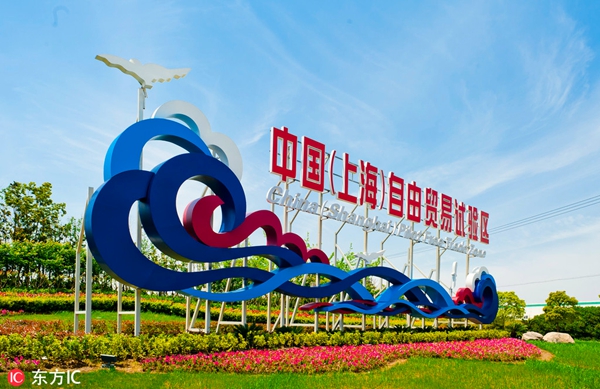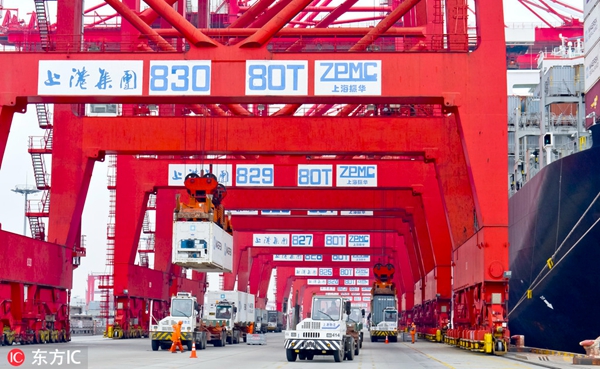Enterprises satisfied with industrial size in Shanghai FTZ

The China (Shanghai) Pilot Free Trade Zone. [Photo/IC]
A recent survey of enterprises in 25 industries at the China (Shanghai) Pilot Free Trade Zone (FTZ) showed that the enterprises are happy with the size of the industries they are involved in.
The survey, conducted by the National Bureau of Statistics Pudong investigation team and the Shanghai FTZ policy research bureau, covered industries such as cross-border e-commerce, financial leasing, biomedicine, integrated circuits, internet-connected vehicles, and artificial intelligence, and related enterprises the annual revenue of which exceeds10 billion yuan and 100 billion yuan.
In addition to industry size, the enterprises also spoke highly of the zone's opening up as well as its laws, policies and mechanisms.
Take the bonded zone, part of the Shanghai FTZ, as an example. Its leasing industry and technical service industry achieved revenue of 23 billion yuan and 25 billion yuan respectively in 2018, up by 20 percent and 15 percent.
Nearly 15,000 of its newly-established enterprises were qualified to pay taxes, contributing total taxes of 13.33 billion yuan in 2018, a year-on-year increase of 31.2 percent.
Certain enterprises also gave suggestions on helping the FTZ achieve high-quality development.
Some hope for further reduction of items requiring administrative approval, further simplification of approval procedures, and application of a registration system rather than an approval system to more projects, although they acknowledged the zone's previous achievements in approval system reform.
Others advised the zone to borrow experiences from advanced regions and carry out more precise supportive policies for different industries, such as simplifying the financial support qualification authentication and application procedures for special purpose vehicles in the aircraft leasing sector.

A view of the Yangshan Deep-Water Port, the world's largest automated cargo terminal and part of the China (Shanghai) Pilot Free Trade Zone.[Photo/IC]
The Shanghai FTZ now attracts more and more multinationals, thanks to its improved business environment.
Statistics showed that ten multinationals located their regional headquarters in the bonded area of Shanghai FTZ in 2018, which increased the total number of multinationals' regional headquarters in the area to 94, accounting for 30.9 percent of the total number in Pudong.
However, different industries have different demands for a business environment, the Pudong investigation team found. The cross-border e-commerce and financial leasing industries expected an optimized fundraising environment for further growth.
The integrated circuit, biomedicine, and internet-connected vehicle industries rely more on supporting industries.
Moreover, the new technology fields such as artificial intelligence and intelligent manufacturing have become new growth poles of the FTZ.
Some big data enterprises suggested that supporting industries should be improved for the benefits of big data in the Shanghai FTZ, as the zone lacks related public service platforms like third-party testing, certification platforms and a big data open source community.


 China's public holidays for 2025
China's public holidays for 2025  Shanghai FTZ: Go all out to build China's first pilot zone for Silk Road E-commerce cooperation
Shanghai FTZ: Go all out to build China's first pilot zone for Silk Road E-commerce cooperation  Favorable policies boost 'China Travel' trend
Favorable policies boost 'China Travel' trend  play
play 